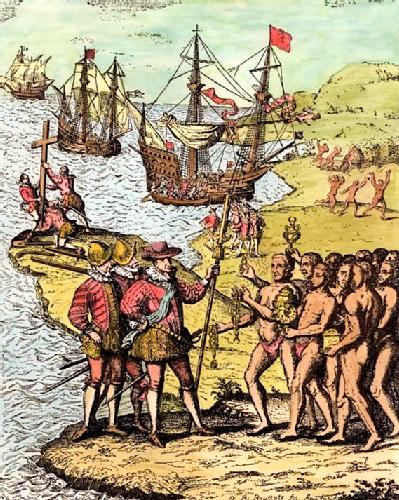Facing the Other: European Encounters with the New World, 1500-1650 (HI31B)

Please note that this module has been
temporarily withdrawn and is therefore
not available to students in 2016/17.
This 30 CATS undergraduate final-year Special Subject is co-taught by Professor Rebecca Earle and Dr Claudia Stein. Our offices are in rooms H327 (Rebecca) and H312 (Claudia), and our office hours are listed on the doors. You may also make an appointment to see either of us outside of office hours by contacting us via email on R.Earle@warwick.ac.uk and C.Stein@warwick.ac.uk, or by telephone on 024 76 523466 (Rebecca) or 024 765 23428 (Claudia).
When Columbus and his crew arrived in the Caribbean in 1492 he unleashed a series of events that were literally world-changing. The European ‘discovery’ of the Americas led to the such disparate events as the Atlantic slave trade and the roast potato. It also posed a conceptual challenge to Amerindians and Europeans alike. European explorers such as Columbus were confronted with something of which they had no prior knowledge. A completely new world had to be incorporated into their cosmological, geographical, medical, botanical, zoological and anthropological understanding. The ‘shock of the new’ was no less challenging for the many indigenous cultures the Europeans encountered in the Americas. Much like their European counterparts, they, too, tried to come to terms with the unknown by using categories and suppositions couched in and inherent to the mentalities of their own cultures. This Special Subject looks at the many ways in which this newness was recognized, confronted and explained by European and New World authors. We will follow the slow (and often painful) process of encountering the new, and explore the various attempts Europeans and Amerindians made to understand and interpret the unfamiliar.
This Special Subject, designed for final year undergraduate students, is interdisciplinary in approach. It employs a variey of approaches to research, including social and cultural history, economic history, colonial studies, literary studies and art history, as well as history of medicine and the sciences. It employs a range of primary sources from both Europe and the Americas. It is the Department's first module to combine its strength in the history of medicine and science with its longstanding focus on the history of the Americas. By examining the interactions between European and New World modes of understanding the module encourages students to cross geographical, disciplinary and conceptual boundaries.
